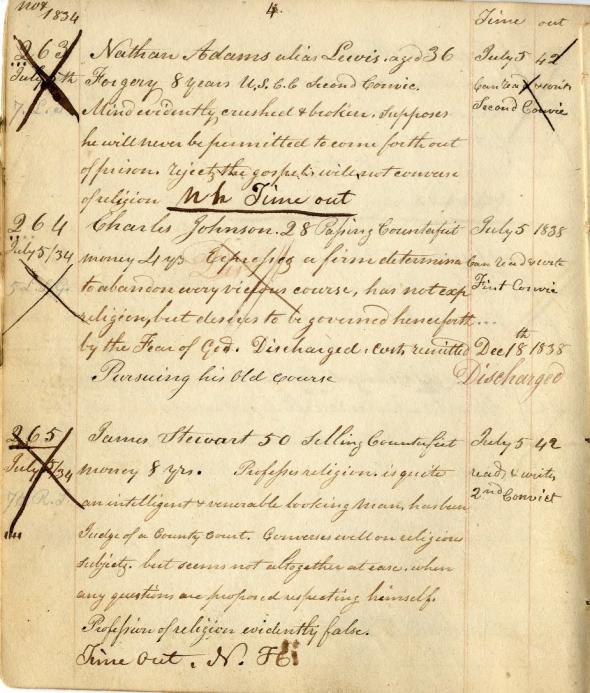The American Philosophical Society’s library holds four fascinating admissions books offering details on prisoners held at Philadelphia’s Eastern State Penitentiary in the 1830s and 1840s. Three of those books seem to have been kept by Thomas Larcombe, a Baptist minister who was the first to hold the position of “moral instructor” at the prison.
It’s a little difficult to read the scanned versions of the books, but Scott Ziegler, of the American Philosophical Society, and Michelle Ziogas have transcribed the information within and made the data available through the University of Pennsylvania’s Magazine of Early American Datasets. Two admission books’ worth of Larcombe’s notes on Eastern State’s prisoners, one dated 1830–1839 and the other 1839–1843 appear here in .csv files.
It might sound strange to say that a spreadsheet makes riveting reading, but these do. Each prisoner’s row of entries has a name, an age, a prisoner number, and notes on the nature of the offense and the sentence. Some also offer information on ethnicity, religion, and occupation; most have information on the offender’s literacy, relationship to alcohol, and marital status.
But it’s the last column, “Description,” that’s most compelling. Larcombe wrote down his impressions of the prisoners’ “moral status,” which, for him, meant their relationship to Christianity.
A man of prety good mind, but cooly and desperately determined to evil because of this hopelessness of retrieving character.
Old convict. Seems to have his feelings awakened but not very hopeful.
Professes conversion, appears to possess a quiet and humble spirit, if sincere. Confesses having been addicted to Onan. Sod. Bestiality.
Has thought and read on religious subjects, until nearly deranged or quite, quitted it and found relief in being bust at work, don’t wish to think of religion now.
In Larcombe’s notes, you can read the frustration of the minister encountering prisoners who wanted nothing to do with him, even if he was their first interlocutor in days. (Eastern State kept prisoners in “cellular isolation” at this time. Offenders were alone in their cells 24 hours a day, save during their exercise hour, which they spent in isolated individual yards adjoining their cells.)
Taciturn, not willing to speak of his crime. Says it was done in a drunken spree. Is not willing to admit he proposed to the other to steal…
May be regarded as a deplorable if not a hopeless case, seems to have no feeling proper to his condition.
Perfectly hardened, will not converse at all on any subject
Some of Larcombe’s assessments convey the anti-Catholicism of the time. Philadelphia was the scene of two anti-immigrant riots in 1844, during which mobs targeted Catholic churches and Irish homes. Larcombe perceived some of the prisoners as particularly unreachable because of their Catholicism.
Irish catholic. Seems hardened against religious instruction.
Talks like one possessed of more light than is common to Catholic, yet Catholic inveterately attached to Popery.
Irish, Catholic (probably) no great prospect of imparting useful instruction to one in such darkness…
Hardened and hopeless, bitter spirit against all religion but popery and treats everything American with contempt.
But the entries that are my favorites tell small stories about the prisoners’ lives.
A young man whose whole life has been a series of wretchedness: cast out from home at 18 mos and drive into series of sorrow and vice and almost every vile association and evil practice, his conscious seems terribly awakened
A slave who ran away from Maryland, was drunk when the crime was committed. Thinks his confinement will promote the welfare of his soul.
Says he came down the Susquehanna on a raft, fell into bad company in a house of ill fame, one or two of whom committed the crime for which he suffers. Knew nothing of them, says he is justly punished for such vile associations.
Justifies his act, says he was attacked by a stronger man, who griped him round the neck & choked him, peed himself, was griped again, could not get relief, drew a pen knife & struck him in the back…
Lived in adulterous intercourse with the wife of his friend while that friend was in England. Driven from the house by the enraged husband took money intrusted to him by the wife, in revenge
German reformed. Proud of his ingenuity as a workman, has discovered perpetual motion and wishes to be at liberty to demonstrate…
Singular term of mind. Perhaps demented. Born with a caul, sees and knows what others cannot. Knows nothing of G[od].
See the Eastern State admissions books in scanned format here. Read the spreadsheets here.
Thanks to Scott Ziegler for his help.
